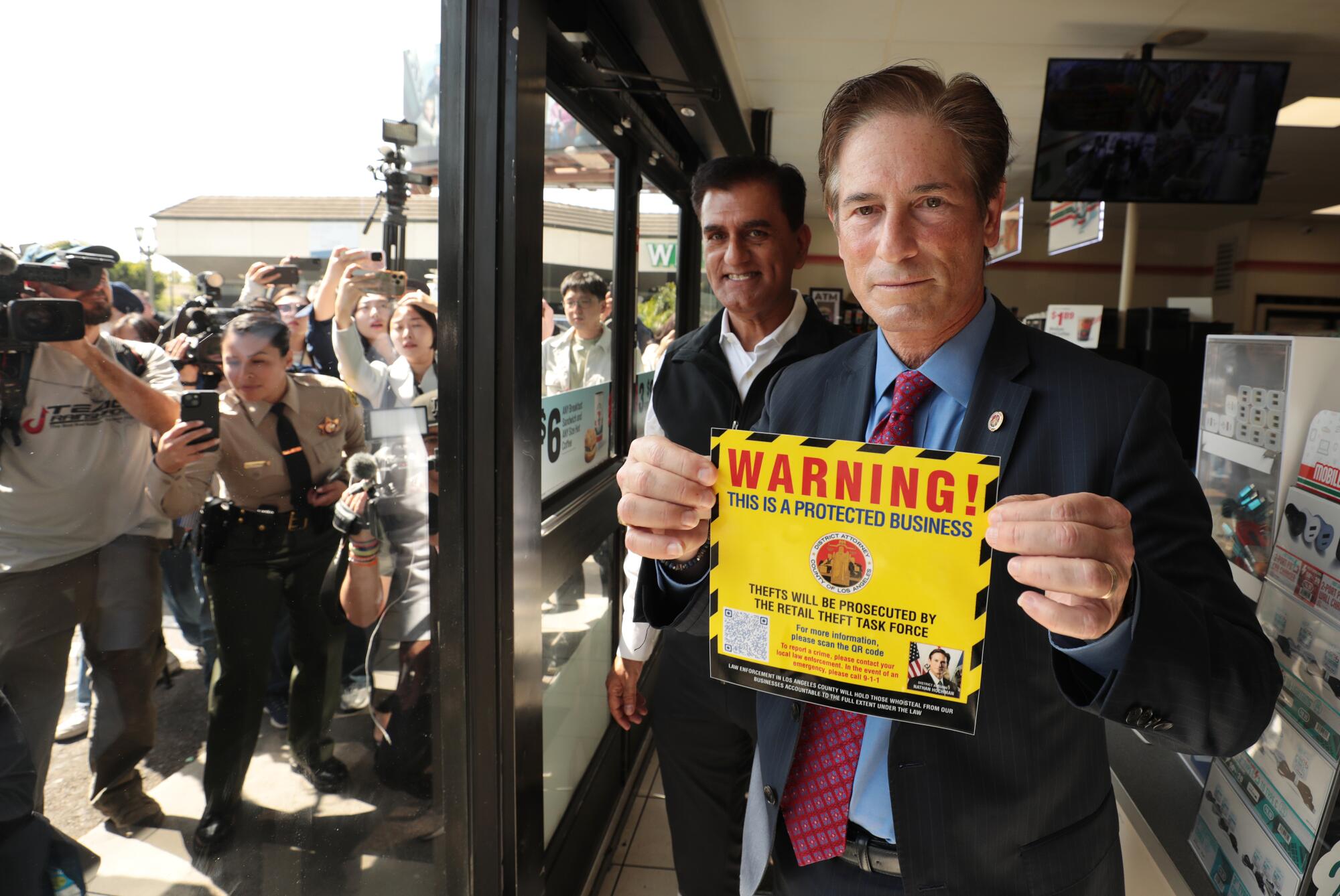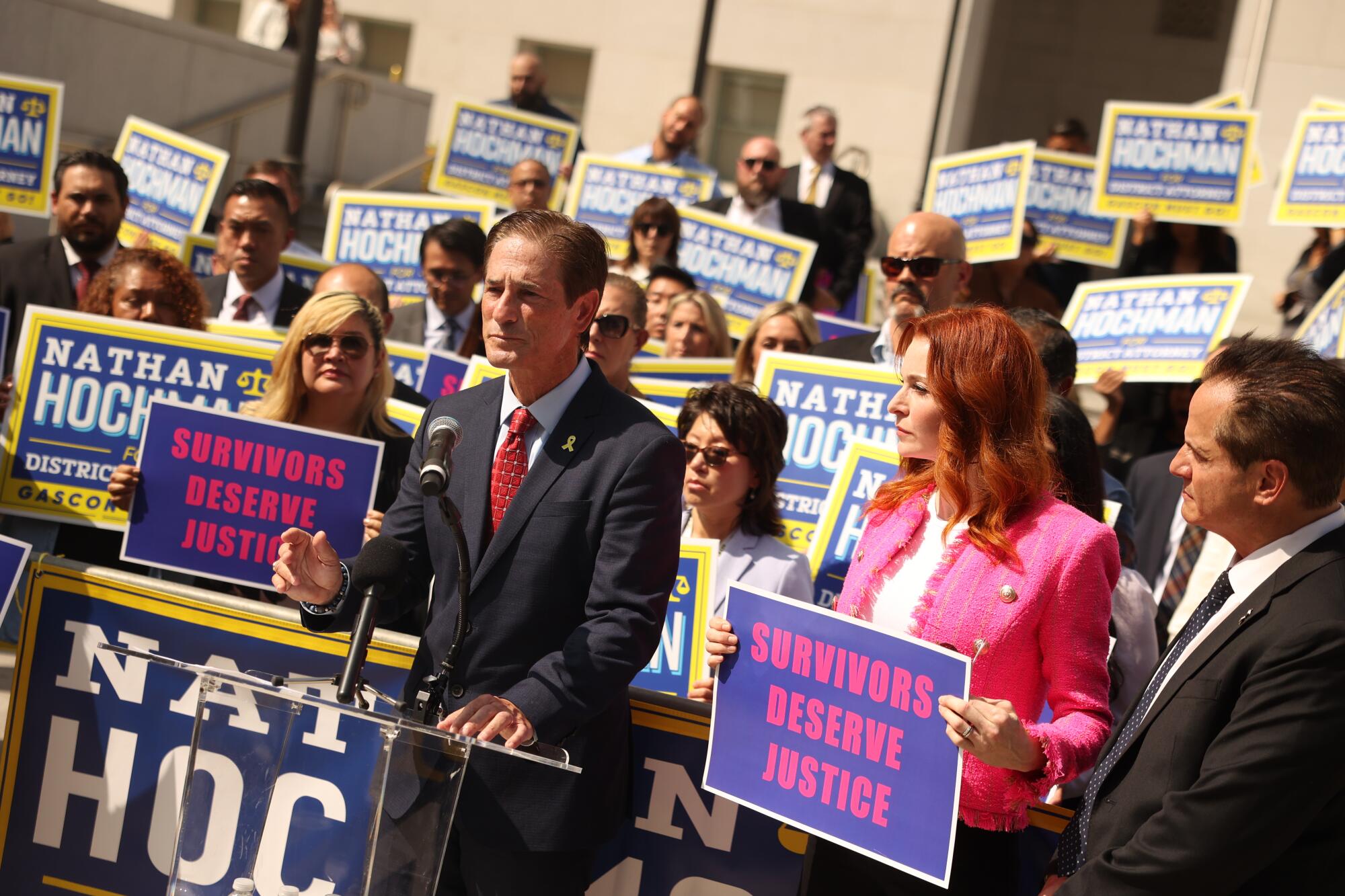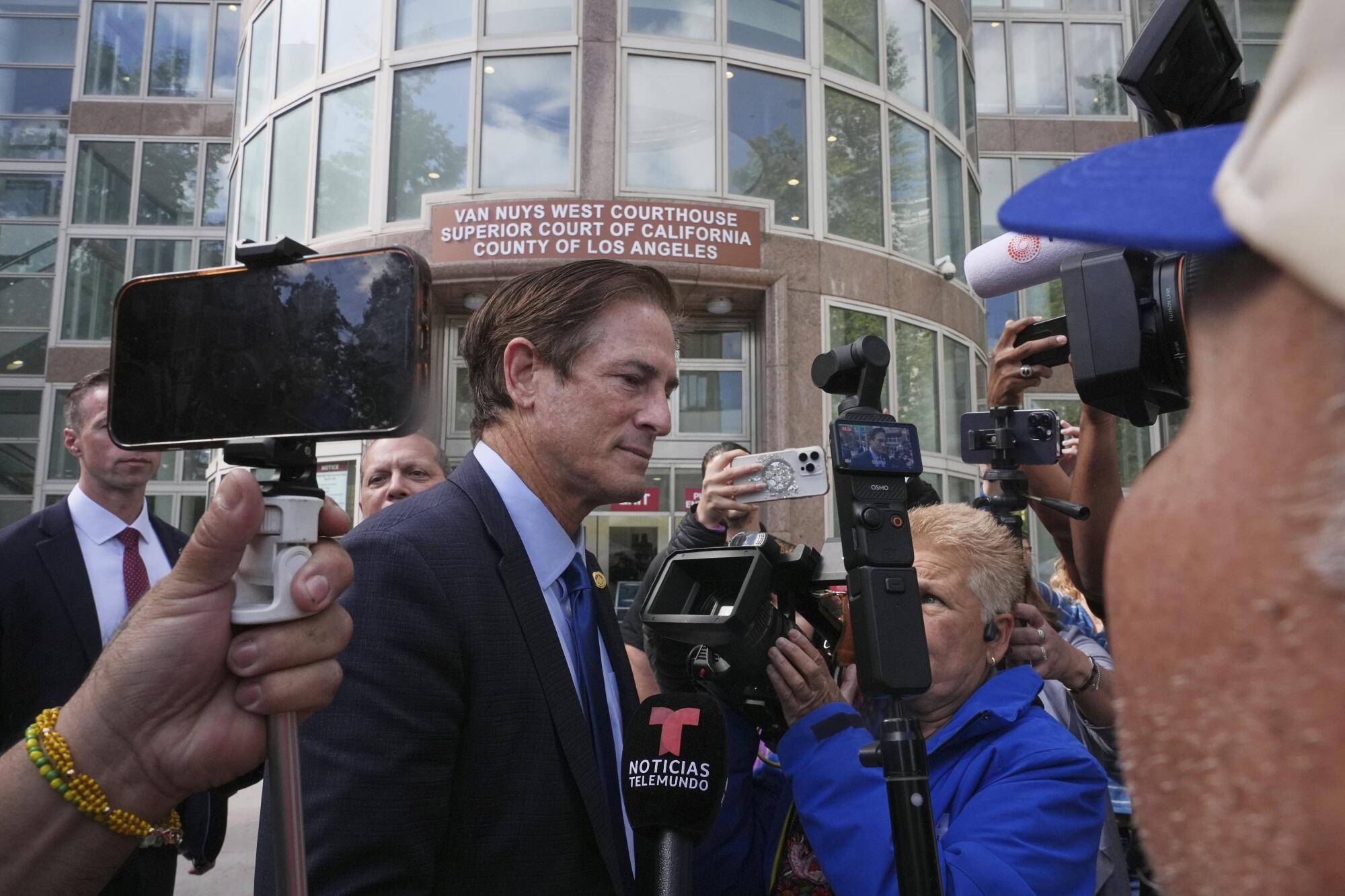-
Fireworks warehouse explosion: Authorities search home of CEO - 18 mins ago
-
Israel Launches New Ground Incursion in Lebanon, Raising Fears for Truce - 24 mins ago
-
Vikings Linked to Major Roster Move Ahead of Training Camp - 43 mins ago
-
Body scanners? Drug-sniffing dogs? Virtual mail? L.A. County wants contraband crackdown inside juvenile hall - 58 mins ago
-
A Dark-of-Night Flood Escape at the River Inn in Texas - about 1 hour ago
-
What’s leaving Netflix in July 2025? Full List of Movies, Shows - about 1 hour ago
-
‘Go away!’ SoCal hiker captures scary encounter with mountain lion on video - 2 hours ago
-
Elon Musk Consulted Curtis Yarvin, Right-Wing Thinker, on Third Party - 2 hours ago
-
PGA Tour Posts Persimmon Gift for Rory McIlroy amid Grand Slam - 2 hours ago
-
L.A. must remove 9,800 encampments. But are homeless people getting housed? - 2 hours ago
L.A.’s top prosecutor restores ‘normalcy.’ Can it last under Trump?
When President Trump deployed the National Guard to quell protests last month against immigration raids unfolding across Los Angeles County, he claimed widespread lawlessness forced him to send in the troops.
Days later, L.A. County Dist. Atty. Nathan Hochman stepped in front of news cameras to announce charges against people who allegedly attacked police during the demonstrations. He avoided mentioning Trump or the swarms of masked federal agents descending on parks, workplaces and schools, but tried to push back against the White House’s chaos narrative.
Noting that the unrest was confined to a small section of downtown, Hochman promised to hold the lawbreakers accountable and disputed that Los Angeles was “under siege.”
Reflecting on the moment in a recent interview with The Times, Hochman said he wanted to set the record straight without igniting a partisan dispute.
“What I’m hearing and reading and seeing is a political discourse that I have no interest in engaging in,” he said. “But one that is misstating what the factual context is on the ground.”
A former Republican who rebranded as an independent last year, Hochman promised to “get politics out” of the district attorney’s office. He endorsed Kamala Harris in the 2024 presidential race but has stuck to his self-described “hard middle” since, focusing instead on restoring order to an office he criticized as being too chaotic under his predecessor.

Federal immigration agents near MacArthur Park in the Westlake area on July 7.
(Carlin Stiehl / Los Angeles Times)
Now more than six months into Hochman’s first term, prosecutors and law enforcement officials say the new district attorney has delivered “a return to normalcy” after the contentious term of progressive luminary George Gascón. By repealing nearly all of Gascón’s sweeping policies, Hochman is allowing his prosecutors to mete out justice as they see fit, restoring a relative degree of harmony to an office that spent four years at war with itself.
But Trump’s aggressive immigration enforcement campaign is testing the limits of Hochman’s neutrality.
When immigration agents followed two women through an L.A. courthouse last month and arrested them, it drew outcries from nearly all corners of L.A.’s legal community. But not Hochman, whose strained diplomacy has raised eyebrows.
“When the head prosecutor in the county doesn’t take a position, silence may appear to the community as support,” said L.A. County Public Defender Ricardo Garcia.
Hochman said that his office is not collaborating with the federal government on immigration enforcement and that he would prefer if immigration agents let state-level cases play out before taking action.
“I’m doing my best to focus on my mission, which is public safety. There’s a lot of politics going on and a lot of noise above that mission, whether it’s the president squabbling with the governor, squabbling with the mayor or anybody else who wants to interject in the political discussions,” he said. “I’m going out of my way nowadays to keep our focus in this office on the public safety aspect.”
It was that focus that made Hochman speak up at the news conference. He recalled watching TV news and social media clips of the first weekend of protests that echoed Trump’s proclamations that the city might burn down.
“You’d swear to God, L.A. was under siege. I mean I got scared the first night,” he said. “I’m calling up my people and I’m saying, ‘Is this going on throughout the city and the county?’”
Superpowers, celebrity trials and stark contrasts
Hochman’s measured approach stands in contrast not only to Gascón’s but also to his counterpart’s at the federal prosecutor’s office in Los Angeles.
During a news conference on arrests of people who allegedly attacked police during last month’s protests, Hochman calmly laid out the legal reasoning for the various prosecutions during the politically charged events. By comparison, U.S. Atty. Bill Essayli took the microphone minutes later and parroted Trump verbatim before pushing a long-held conservative suspicion about out-of-state agitators causing violence.
Although Hochman talked as a candidate about crime in apocalyptic tones, took significant money from conservative megadonors and worked with fundraisers tied to Trump, his overhaul of the district attorney’s office has not resembled the right-wing makeover some feared it would. If anything, Hochman’s law and order orientation is in line with statewide voter shifts on criminal justice reform.

Dist. Atty. Nathan Hochman announces “aggressive action” against retail theft during a news conference outside a 7-Eleven in May.
(Al Seib / For The Times)
Gone are Gascón’s reformist policies discouraging the use of cash bail and limiting the use of sentencing enhancements. The death penalty is back on the table, although Hochman has not yet pursued it against a defendant.
Six months into his term, data show Hochman is charging felonies at roughly the same rate Gascón did. Although the new district attorney vowed during his campaign to charge more juveniles as adults, so far he has pursued a total of five cases — the same number Gascón had at this time last year, according to a spokesperson for the office.
After Hochman wiped out Gascón’s ban on filing certain misdemeanors, prosecutors charged nearly 70% of all low-level cases presented by police in the first half of 2025, records show. Hochman says it’s a necessary step to deter criminals, but Garcia and other advocates warn it puts more people at risk of deportation.
Hochman says he’s merely enforcing the law, and often presents himself as a man trying to get the trains back on time. In his downtown office, a framed silver age comic book sits by his desk, chronicling the adventures of “Mr. District Attorney.” Hochman laughs when describing the 1940s hero who seems to share his straight-ahead approach to the job.
“He doesn’t have any superpowers,” Hochman says. “Turns out, he’s just a really good lawyer.”
In an attempt to win over rank-and-file prosecutors, Hochman filled his administration with office veterans. And he’s made a point of dropping in on trials large and small — from celebrity defendants to juvenile cases far from the headlines — to cheer on his staff.
“We’ve seen a return to normalcy. We have a general understanding of what the expectations are of us,” said Deputy Dist. Atty. Ryan Erlich, president of the union that represents most of Hochman’s staff. “We feel the upper management understands the job that we do, and it allows us to communicate and work on issues.”
Marilyn Manson, Menendez brothers and political pitfalls
Good vibes aside, some of Hochman’s decisions have rankled line prosecutors and led to political pitfalls.
The office has been on the wrong end of several high-profile cases this year, leading some prosecutors to question why the district attorney’s even-keel behavior tends to falter when the lights are on brightest.
“He wants to be recognized, so he’s always involved in these high-profile cases,” said one veteran deputy district attorney, who spoke on the condition of anonymity for fear of retribution. “Sometimes to the detriment of the case.”
In January, Hochman announced he would not bring rape charges against rock star Marilyn Manson — roughly four months after he held a campaign event alongside some of Manson’s purported victims to attack Gascón’s handling of the case.

During his campaign for district attorney last year, Nathan Hochman spoke alongside actor Esme Bianco to criticize his opponent’s handling of a case involving singer Marilyn Manson.
(Michael Blackshire / Los Angeles Times)
“You don’t parade people out. … I found that so deeply offensive,” said Lenora Claire, a former member of the district attorney’s office’s victim advisory board. “What was that choice other than being completely irresponsible? He hadn’t reviewed the case.”
Hochman said the case was handled appropriately and prosecutors made a decision not to charge that was “rooted in facts and the law, not a political agenda.”
Hochman’s personal involvement in the resentencing hearings for Erik and Lyle Menendez, the brothers who killed their parents in a pair of brutal shotgun murders in 1989, also drew scrutiny. The brothers were each serving a life sentence with no hope of release until Gascón petitioned for their resentencing last year, a move Hochman opposed both on the campaign trail and then in court.
Hochman’s interactions with the Menendez family drew allegations of bias and his decision to transfer the prosecutors who filed Gascón’s petition resulted in a civil suit. During one hearing in May, he personally took over arguments in the courtroom and said the brothers needed to show proper “insight” into their crimes, even after a judge repeatedly warned him it was legally irrelevant.
The brothers were resentenced and could be released by the parole board later this year. Hochman defended his hands-on approach — and maintained he ultimately came out ahead.
“When people say did you win or lose the Menendez case, I say we won. The defense was asking for immediate release through a voluntary manslaughter finding. The judge didn’t go there,” Hochman said.
Tougher sentences, ticked off attorneys
After a campaign fueled by pro-law enforcement rhetoric, some defense attorneys say Hochman’s election has emboldened prosecutors to become unnecessarily aggressive.
“They are focused more now on incarceration and high prison sentences, as opposed to probation and the opportunity for rehabilitation,” attorney Damon Alimouri said.
One of Alimouri’s clients, Gerardo Miguel, is currently awaiting trial in a vandalism and burglary case after allegedly smashing his way into a Los Angeles home while screaming, “call the police” before hiding in the victim’s bathroom, according to court records.

Dist. Atty. Nathan Hochman outside the Van Nuys Courthouse during a hearing in the case of Erik and Lyle Menendez in May.
(Damian Dovarganes / Associated Press)
No one was injured in the incident. Miguel did not steal anything, nor does he have a criminal record. Yet, Alimouri said, the district attorney’s office’s only plea offer would send his client to state prison.
“[The prosecutor] said, I’m concerned about the safety of the public, this guy could have done X, Y and Z,” Alimouri said of the plea negotiation. “But the fact of the matter is [my client] didn’t do X, Y and Z. He curled up in the fetal position and called for help.”
Garcia, the public defender, also expressed frustration that Hochman’s prosecutors have been fighting attempts to get defendants into the county’s Rapid Diversion Program, which allows defendants to get treatment without taking on a criminal conviction. The program has a 90% success rate, according to Garcia.
Hochman, who championed the use of some mental health diversion programs during his campaign, says it’s a lack of county resources that limits the use of alternative justice programs.
“We don’t have enough beds, anywhere in this county, for dealing with that whole population,” Hochman said.
Allocating resources is the job of L.A. County’s Board of Supervisors, a panel that leans heavily left. Hochman won’t face reelection until 2028, and until then observers say his centrism could be an asset.
“The advantage to being an independent is he can put the voters in the city before his political party,” said Dan Schnur, who teaches political communications at the University of Southern California. “Anyone with a D or an R next to their name comes under immense pressure to toe their respective party lines.”
Times staff writer Richard Winton contributed to this report.
Source link


















